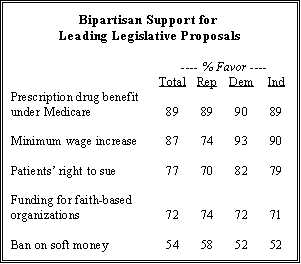Introduction and Summary

As President Bush returns from his first overseas trip, his approval ratings are inching downward and an increasing number of Americans now say they disapprove of the job performance of GOP leaders on Capitol Hill. By contrast, the newly-installed Democratic leaders in the Senate are winning initially positive approval marks (50% vs. 28% disapprove), while the Democrats’ agenda of tougher regulations on health maintenance organizations (HMOs), a raise in the minimum wage and providing prescription drugs through Medicare continues to draw support from a solid majority of Americans.
The latest Pew Research Center survey of 1,200 Americans, conducted June 13-17, shows that in spite of extensive media coverage of the president’s trip, relatively few Americans closely tracked Bush’s talks with European and Russian leaders. Just one-in-ten said they followed the trip very closely, with another 25% following it fairly closely. The public was significantly more interested in foreign trips by other recent presidents. This month, more than twice as many followed Sen. James Jeffords’ departure from the GOP very closely (21%) than paid close attention to Bush’s trip.
Just half of Americans now say they approve of the job the president is doing, while 33% disapprove. While that is not markedly different from his 53% rating in May, it represents a steady erosion from his high in the Pew survey of 56% recorded in April. Once again, the public is divided along partisan lines over Bush’s performance, as more than eight-in-ten Republicans (86%) say they approve of the job the president is doing, compared to only about a quarter (26%) of Democrats.

Until Jeffords’ decision to bolt the Republican Party, which tipped control of the Senate to the Democrats, GOP congressional leaders had been enjoying their first sustained period of general approval since 1998. In May, a 45% plurality gave them favorable marks. Now, the public is evenly divided, with 40% approving of their job performance and the same number disapproving. Somewhat surprisingly, more than a third of Republicans (35%) endorse the job Democratic leaders are doing, compared to 20% of Democrats who say the same about GOP leaders.
The Democrats’ agenda wins broad public backing and even large numbers of Republicans express support for Democratic proposals to provide prescription drug coverage through Medicare, boost the minimum wage and allow patients to sue their HMOs. Bush’s plan to permit faith-based organizations to apply for government funding to provide social services also continues to draw bipartisan support. Proposals to eliminate the unlimited contributions to political parties known as soft money are favored by a slim majority (54%).

As the Senate begins debate on HMO reform legislation, 58% of the public supports government-imposed national standards for health care plans, while 30% say this would get the government too involved in health care. Among Republicans, just 44% support national standards, compared to 42% who say this would mean too much of a government role.




